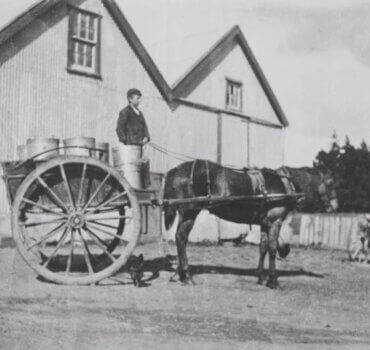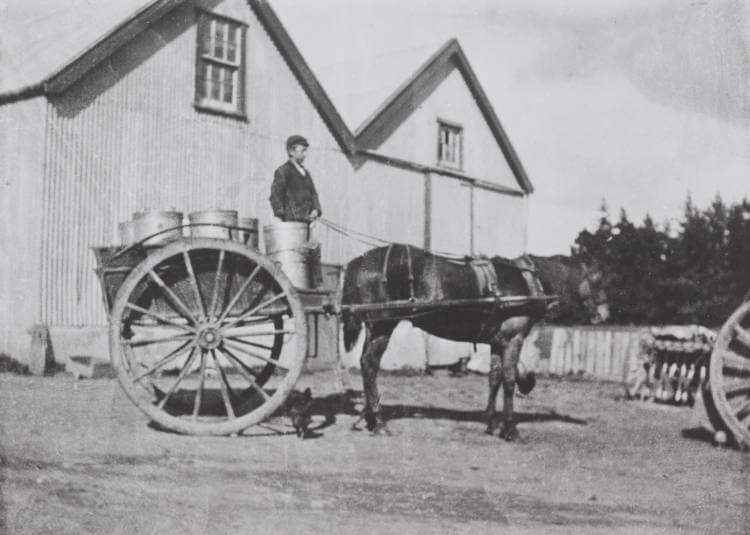
Cream cans on a farm cart
Edwin Robinson survived the land wars only to die in an unfortunate accident as Meghan Hawkes reflects on in Tales from the Passed.
Cream cans on a farm cart
When a machinery belt broke at the Paterangi creamery in November 1902 Mr Russell, manager, went to repair it.
Edwin Robinson was standing by holding the horses and wagon which contained seven or eight full cans of milk. Mr Smith, intending to help, came onto the platform and, thinking he saw an empty can, touched the lever to let it down. As soon as he did that the weight of the can caused it to hit the wagon with a crash frightening the horses that immediately bolted. Edwin was knocked to the ground and went under the wagon.
He was picked up unconscious and carried into Mr Russell’s house. For the next two hours 58-year-old Edwin remained insensible. When Dr Pairman arrived, he dressed and stitched his wounds, and although questioning the now responsive Edwin, he received only vague answers.
The doctor advised that Edwin must stay at the creamery manager’s home and Mrs Russell kindly did all she could for the injured man.
Edwin and his brother, Albert, had come to New Zealand from London on the ship Armstrong in February 1865.They were young men; part of a wave of immigration which had seen 1000 people on three ships brought to the country within 10 days. The boys were fortunate in that the voyage of 100 days had been unremarkable, with one birth and one death on board. The 197 passengers arrived in a ‘highly healthy condition.’
Three years after arriving, Edwin enlisted at Hamilton in the No 5 Division of the Armed Constabulary under the command of Gustavus von Tempsky, at the time considered a swashbuckling hero. In 1868 Titokowaru’s War, a campaign against land confiscation, broke at Taranaki and von Tempsky and his division, including Edwin, was sent to the front. In the chaos of attacking the bush stronghold many men of the constabulary were badly injured or killed and von Tempsky shot dead. Edwin’s military record says he was dismissed but the unit disintegrated into mutiny and desertion after von Tempsky’s death. Men refused to serve under anyone else and the 5th Division disbanded.
Edwin tried his luck in Canterbury and on the West Coast and Thames goldfields, before marrying Eliza Richdale in 1877 and settling at Te Rore. The couple had eight children and Edwin took a lively interest in the district’s progress, becoming the chairman of the school committee. He was an honorary member, too, of the Paterangi Rifle Club.
The injuries received at the Paterangi creamery proved too much for Edwin and he died at 3 the morning after the accident. Despite the undoubted psychological effects of the Taranaki war Edwin was a quiet and humble man, an ideal colonist, a good neighbour, and a loving husband and father. His loss to the district was called irreparable.
On the news of his death letters of sympathy and about 20 floral wreaths were received by his family from all parts of the Waikato. He was buried at Paterangi cemetery, his funeral perhaps the largest ever seen in that part of Waipā.
Over the years Edwin was joined by his wife and all their children in graves in blocks of four which back on to each other. They are all remembered on a large monument inscribed with the words ‘A family united.’









